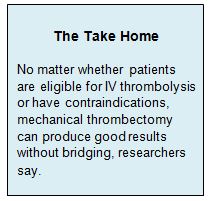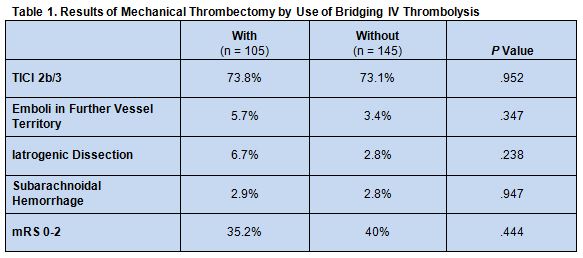Key Points:
- Study reviews data comparing mechanical thrombectomy with, without prior IV thrombolysis
- Bridging not predictive of complications, functional outcome
Whether or not acute stroke patients are given IV thrombolysis prior to mechanical thrombectomy appears to have no influence on the treatment’s safety and effectiveness, according to research published online February 22, 2016, ahead of print in the Journal of NeuroInterventional Surgery.
Ralph Weber, MD, of Alfried Krupp Krankenhaus Essen (Essen, Germany) and colleagues conducted a retrospective analysis of 283 consecutive patients with acute ischemic stroke treated with mechanical thrombectomy in a tertiary neurovascular center over a 14-month period. Data were prospectively collected on periprocedural times, recanalization rate, complications, and long-term functional outcome.
Information on prior use of IV thrombolysis and functional outcome was available for 250 patients, with a mean follow-up of 5.7 months. Overall, 105 (42%) received both IV thrombolysis and mechanical thrombectomy.
There were no differences between those who did and did not receive IV thrombolysis prior to mechanical thrombectomy with respect to successful reperfusion (TICI 2b/3), important intraprocedural complications, and long-term favorable outcome (mRS score 0-2; table 1).
Overall, 75 patients treated with mechanical thrombectomy alone had contraindications for IV thrombolysis. Among patients who did not receive bridging therapy, baseline characteristics and vascular risk factors were similar between those who were and were not eligible for it.
Among patients treated with mechanical thrombectomy alone, favorable outcome was achieved in 48.6% of patients who were eligible for IV thrombolysis compared with 32% of those who had absolute contraindications (P = .042).
Taking Contraindications Into Account
Given that mechanical thrombectomy is the only acute treatment option for patients with contraindications to IV thrombolysis, this subset is “of considerable interest,” write the authors. “No data from randomized trials are available in this patient group and enrollment in the THRILL trial was recently stopped with only a few patients included.”
The current study, though observational, shows that thrombectomy alone can result in favorable functional outcome for one-third of contraindicated patients and nearly half of eligible patients, Weber and colleagues note, acknowledging certain limitations. “Imaging data were not evaluated by a blinded investigator, whereas long-term functional outcome was evaluated in the majority of patients by a blinded investigator,” they write, adding that the reasons why eligible patients did not receive IV thrombolysis varied widely.
Source:
Weber R, Nordmeyer H, Hadisurya J, et al. Comparison of outcome and interventional complication rate in patients with acute stroke treated with mechanical thrombectomy with and without bridging thrombolysis. J NeuroInterv Surg. 2016;Epub ahead of print.
Disclosures:
- Dr. Weber reports receiving speaker’s honoraria from Covidien and Boeheringer Ingelheim and serving on a scientific advisory board for Covidien.



